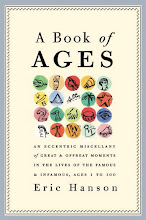Yesterday was Susan Sontag's birthday. The New York intellectual with the pale streak in her hair was born in New York City in 1933, but grew up in Tucson and Los Angeles, graduating from North Hollywood High School at age 15. It's interesting to note when intellectuals become intellectuals, when they self-identify as such. And how do they do it exactly? Does it begin with the black turtleneck? Do they start carrying a copy of Schopenhauer around with them? In 1948, Sontag, then called Susan Rosenblatt, bought her first copy of Partisan Review at a newsstand on Hollywood Boulevard. She was a deep thinker already, but that moment is significant. She was fifteen. When she was 31 she was screen tested by Andy Warhol, and her famous essay "Notes on Camp" appeared. In Partisan Review, of course. When she was 43 she was diagnosed with breast cancer, and given two years to live. They were wrong about her ability to survive. She lived another 28 years, writing 19 more books. At her death, her personal library contained fifteen thousand books, arranged by historical period. Susan Sontag appears four times in A Book of Ages.
Today is the birthday of Benjamin Franklin, the first public intellectual in America and the most famous person of his time. Franklin invented the role of the brainy celebrity, toying with the media of his day, provoking and amusing, pushing Americans towards independence and away from slavery, taking unpopular and untimely stands, inconveniencing people. He drove John Adams nearly mad. He was reckless and calculating. Hard to pin down. He was famously agnostic but he knew how to invoke God to make his adversaries look ridiculous. He was a libertine, an unwed father, a poor parent but full of wise advice on parenting, a wit, a scold, a public-spirited liberal and a famous millionaire. He retired in his early forties, but never really retired. Franklin appears 13 times in A Book of Ages, but the stories about him are so numerous and engaging I could have included him a dozen times more. The thing most appealing about Franklin? He made being old seem glamorous.
Sunday, January 17, 2010
Public Intellectuals
Labels:
agnostic,
Benjamin Franklin,
books,
celebrity,
public intellectual,
slavery,
Sontag,
wit
Subscribe to:
Post Comments (Atom)





No comments:
Post a Comment